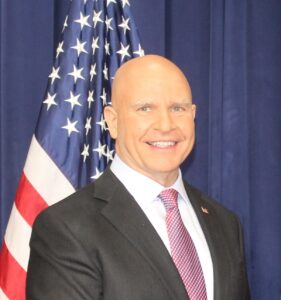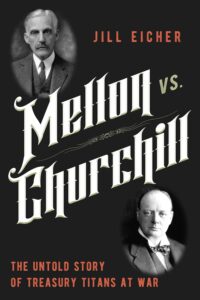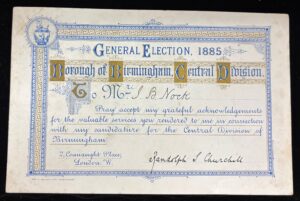
Bulletin #207 — Aug 2025
Why Churchill Matters

August 6, 2025
A Message from the New Executive Director of the International Churchill Society
By ADAM HOWARD
Some of my earliest memories are of sitting quietly in synagogue, watching my grandfather, a rabbi, step up to the pulpit and speak with such passion and clarity that the entire congregation fell silent. When he spoke, people listened, not just to him, but to the generations and traditions to which he gave voice. His words carried the weight of history. Without ever stating it outright, he taught me that history is not just something we study—it is something we live. It moves people. And it can shape the future.
That sense of awe never left me. It led me to become a historian and inspired a career devoted to understanding how, in moments of profound uncertainty, people find the courage to lead.
Before joining the International Churchill Society (ICS), I had the honor of serving as the Historian of the U.S. Department of State. In that role, I had a front-row seat to the evolution of diplomacy and leadership—and witnessed firsthand how insights from the past can inform better decisions in the present. But, long before Washington, there was London.

2025 International Churchill Conference
Years ago, as a graduate student, I traveled to London to research British Foreign Office policy toward the Middle East in the mid-twentieth century. While there, I took time to visit sites connected to two of my personal heroes: Winston Churchill and the Beatles. Though they operated in vastly different spheres, both reshaped twentieth-century culture—one through politics and oratory, the other through music and mass media. What struck me was how each captured the spirit of their time and left a legacy that continues to shape how we understand the modern world.
In Churchill’s case, he did not just understand history—he wielded it with precision. He was more than a participant in world events; he was a master of context, narrative, and timing. He knew how to speak to people’s fears and hopes in equal measure.
Now, as Executive Director of the International Churchill Society, I have the privilege of helping carry that legacy forward—not only by preserving Churchill’s memory but by applying his insights to today’s challenges. Whether mentoring students, publishing scholarship, or convening conversations on global affairs, our work is grounded in the belief that history is most powerful when it is put to use.
Churchill once said, “The longer you can look back, the farther you can look forward.” That is exactly what we strive to do at ICS: look back with care so we can move forward with purpose.
Churchill’s life is not only a story of courage under pressure—it is a case study in the value of applied history. He saw history not merely as an academic pursuit but as a tool for statecraft and leadership. He studied the past not to retreat into it but to equip himself for decisions that would shape the future. In moments of crisis, Churchill drew on centuries of British experience to illuminate the path forward. He referred to the Duke of Marlborough and the Napoleonic Wars when analyzing Hitler’s ambitions. He summoned the memory of past victories and past follies alike to frame arguments, galvanize public opinion, and prepare his government for action.
What Churchill practiced instinctively is now being rediscovered as essential: the idea that leaders who understand historical context make better choices. Applied history uses the past to think through present problems—not just “what happened?” but also “what should we do?” and “what could go wrong?” It encourages humility, critical thinking, and a deeper awareness of cause and consequence. And it trains minds to identify patterns, assess risks, and recognize when today’s headlines echo yesterday’s hard lessons.
This is especially important in a world where complexity and uncertainty abound. Technology moves at the speed of light; geopolitics shifts in unpredictable ways; democracies are under strain. In this environment, a grounding in applied history is not a luxury—it is a necessity. Churchill understood that. His speeches were not simply rhetorical masterworks; they were arguments rooted in historical perspective. His decisions—while far from infallible—were informed by a lifelong engagement with the past and a belief in history’s capacity to guide statesmen through fog and fire.
That belief animates everything we do at the International Churchill Society. We are not here to mythologize Churchill; we are here to understand him—to learn from his triumphs and his errors, and to ask how his example might help today’s leaders meet the moment. We foster dialogue across generations and sectors about the values that sustain open societies.
It is an honor to lead this organization—and for me, it is deeply personal. Because every time I speak to a room of students, policymakers, or history enthusiasts, I am reminded of my grandfather’s voice—and of the timeless power of words, leadership, and history well told. Like my grandfather, Churchill knew how to summon the wisdom of the past and make it resonate in the present. That is why he still matters. Not because he offers easy answers, but because he challenges us to think, to remember, and to lead with perspective.
History, at its best, is not a spectator sport. It is a compass—and Churchill remains one of its most skillful navigators. That is why we study him. That is why we teach his legacy. And that is why, as the world faces new tests of leadership, Churchill still speaks.
This is why Churchill matters to me. In the months ahead, you will hear from others in our community as they show why Churchill’s legacy continues to inspire—as a statesman, a writer, a leader, and a symbol of resilience.
Adam Howard, Ph.D, is Executive Director of the International Churchill Society.
Subscribe
WANT MORE?
Get the Churchill Bulletin delivered to your inbox once a month.
Oops! We could not locate your form.
Privacy




